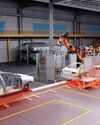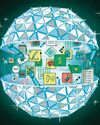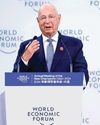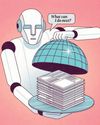
IN 2024, BOTH CUTTING-EDGE TECHNOLOGY and the companies controlling it grew increasingly powerful, provoking euphoric wonderment and existential dread. Companies like Nvidia and Alphabet soared in value, fueled by expectations that artificial intelligence (AI) will become a cornerstone of modern life. While those grand visions are still far into the future, tech undeniably shaped markets, warfare, elections, climate, and daily life this year.
Perhaps technology's biggest impact this year was on the global economy. The so-called Magnificent Seven—the stocks of Alphabet, Amazon, Apple, Meta, Microsoft, Nvidia, and Tesla—thrived in large part because of the AI boom, propelling the S&P 500 to new highs. Nvidia, which designs the computer chips powering many AI systems, led the way, with its stock nearly tripling in price. These profits spurred an arms race in AI infrastructure, with companies constructing enormous factories and data centers—which in turn drew criticism from environmentalists about their energy consumption. Some market watchers also expressed concern about the increasing dependence of the global economy on a handful of companies, and the potential impacts if they prove unable to fulfill their massive promises. But as of early December, the value of these companies showed no sign of letting up.
Though not with the explosive novelty of ChatGPT's 2023 breakthrough, generative AI systems advanced over the past 12 months: Google's DeepMind achieved silver-medal results at a prestigious math competition; Google's NotebookLM impressed users with its ability to turn written notes into succinct podcasts; ChatGPT passed a Stanford-administered Turing test; Apple integrated new artificial intelligence tools into its newest iPhone. Beyond personal devices, AI played a pivotal role in forecasting hurricanes and powering growing fleets of driverless cars across China and San Francisco.
This story is from the {{IssueName}} edition of {{MagazineName}}.
Start your 7-day Magzter GOLD free trial to access thousands of curated premium stories, and 9,000+ magazines and newspapers.
Already a subscriber ? Sign In
This story is from the {{IssueName}} edition of {{MagazineName}}.
Start your 7-day Magzter GOLD free trial to access thousands of curated premium stories, and 9,000+ magazines and newspapers.
Already a subscriber? Sign In

Q & A: Borge Brende
The World Economic Forum president talks with TIME editor Sam Jacobs

Q & A - Rene Haas
Arm's CEO on how his hardware is supporting the Fourth Industrial Revolution

The conflicts looming over 2025
WHEN DONALD TRUMP TOOK THE OATH OF OFFICE AS President in January 2017, his first foreign policy priority was to get tough on China. The Trump 2.0 Administration will continue that work. But when he strides back into the Oval Office in January 2025, Trump will also become responsible for U.S. management of two dangerous wars, the kinds of hot foreign policy crises he was fortunate to avoid during his first term.

Rev Lebaredian
Nvidia's vice president of Omniverse and simulation technology on training AI-powered robots

5 predictions for AI in 2025
New uses and policy questions come into focus

Roy Wood Jr. The comedian on his new stand-up special, the importance of working in food service, and learning from Keanu Reeves
8 QUESTIONS WITH Roy Wood Jr.

A call for global cooperation in the Intelligent Age
Cultivate wisdom along with innovation

The D.C. Brief
IN THE END, THE THREAT OF A FARright revolt proved more menacing than most imagined, as Republican Mike Johnson initially came up short on Jan. 3 during the first balloting to keep him as Speaker.

The digital labor revolution
OVER THE PAST TWO YEARS, WE'VE WITNESSED advances in AI that have captured our imaginations with unprecedented capabilities in language and ingenuity. And yet, as impressive as these developments have been, they're only the opening act. We are now entering a new era of autonomous AI agents that take action on their own and augment the work of humans. This isn't just an evolution of technology. It's a revolution that will fundamentally redefine how humans work, live, and connect with one another from this point forward.

Tech we can trust
Serving humanity's best interests must be at the center of progress